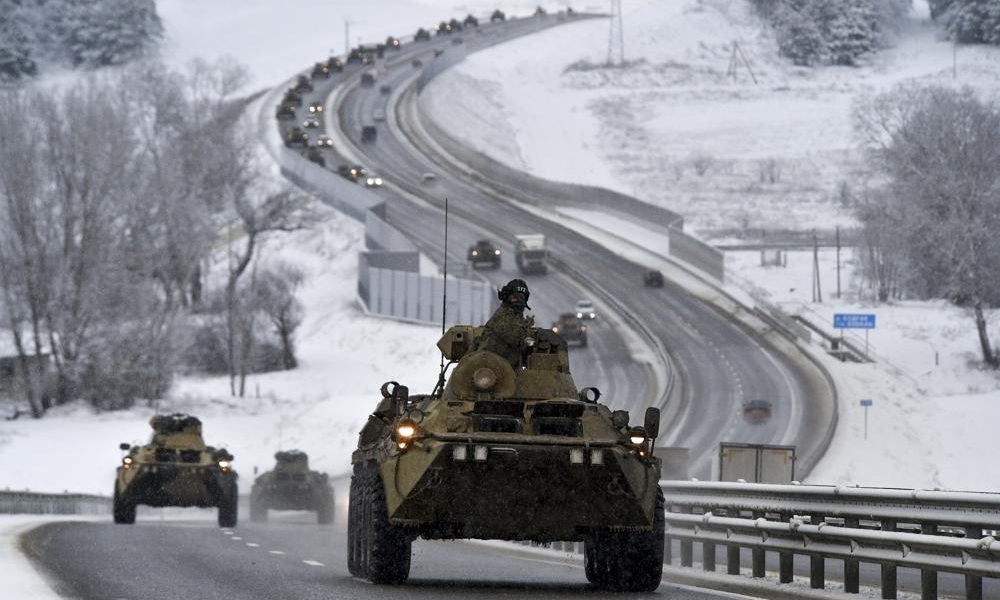By Leila Wickliffe
After weeks of rising tension, United States officials claim that a Russian attack on Ukraine could happen “any day now.” As of February 21, President Biden has agreed to a potential summit with President Putin if Russia doesn’t invade Ukraine. Yet, the U.S. sees an invasion as imminent, dimming hopes for a meeting between Biden and Putin. Additionally, Putin has recognized the independence of two separatist states, Donetsk and Luhansk. This move may be the spark for a Russian military invasion. Ukrainian officials said that the leaders of these two regions could request military aid from Russia, allowing Russian troops into Ukrainian territory. “Let me emphasize once again that Ukraine for us is not just a neighboring country. It is an integral part of our own history, culture, spiritual space,” President Putin expressed Ukraine’s importance to Russia in a recent address. Russian troops are still stationed around Ukraine, some already touring the two separatist regions.
However, this crisis was in the works for far longer than the past few months. The Russo-Ukrainian conflict began in February 2014 when Russia annexed Ukraine’s peninsula Crimea. Further tensions increased after Russian loyalists seized government buildings in Donetsk and Luhansk. This marked the beginning of the trench war with Ukrainian forces. Over 13,000 people have died fighting in those regions since. The Russian government has long feared Ukraine’s possible membership in international organizations such as the European Union (EU) and the North Atlantic Treaty Organization (NATO) because membership would complete a western wall of allies restricting Russia’s access to the Black Sea.
President Biden has ruled out sending combat troops to Ukraine but is considering supporting a post-invasion Ukrainian resistance. He did say that he would be committed to protecting “every inch” of NATO territory. Secretary of State, Anthony Blinken asserted the conference “an unshakable U.S. commitment to Ukraine’s sovereignty and territorial integrity.” Yet he did not publicly disclose the limits of this commitment. According to Reuters, the U.S. plans to cut ties with specific Russian banking systems if troops invade Ukraine, subsequently damaging Russian economics.
Other countries have condemned Putin for his actions, including many European leaders. Australia has also threatened to impose sanctions on Russia in the event of a Ukrainian invasion. The world is watching, especially other authoritarian regimes. China’s president Xi Jinping and Putin are testing a possible alliance against the U.S. and their allies. The Taiwanese government is closely monitoring the Ukrainian situation. Lai I-Chung, the president of the Prospect Foundation in Taiwan’s capital, said in a recent interview, “If the Western powers fail to respond to Russia, they do embolden the Chinese thinking regarding action on Taiwan.” Democratic countries are concerned about autocracies basing decisions on what their military force can do. Alexander Gabuev of the Carnegie Moscow Center noted, “A new multipolar order is taking shape that reflects an unstoppable shift in power to authoritarian regimes that support traditional values.”
Domestic repercussions in the U.S. are bound to happen. These repercussions could range from economic to humanitarian crises. According to NPR, energy prices could soar as Russia is a major exporter of oil and natural gas, and this has led to government officials shying away from harsh sanctions on Russia. Even without sanctions, Russia could cut and limit access to energy supplies. Almost 40 percent of natural gas in the European Union comes from Russia. Food and automobile industries could also be hit hard by sanctions as Russia exports many rare minerals and metals needed for items like semiconductor chips or fertilizer. Many U.S. sectors have been warned about a possible disruption in the supply chain. All of these issues could culminate in a shock to the international stock market. U.S. troops are stationed in Poland to assist in a large-scale evacuation. Although many European countries would see an influx of refugees, officials predict that the U.S. would see some Ukrainian refugees. President Biden addressed domestic impacts in a speech Tuesday, “If Russia decides to invade, that would also have consequences here at home. But the American people understand that defending democracy and liberty is never without cost. I will not pretend this will be painless.” For now, the world will have to wait for the next move either by the U.S. or Russia, and the other will respond accordingly.





